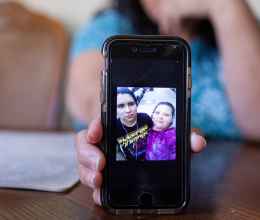
NEW YORK TIMES: One inmate said he was forced to walk down a hallway naked after sheriff’s deputies accused him of stealing a piece of mail. They taunted him in Spanish, calling him a derogatory name for homosexuals.
An A.C.L.U. monitor said she saw several deputies beat a man inside the Twin Towers jail.
Another former inmate said that after he protested that guards were harassing a mentally ill prisoner, the same deputies took him into another room, slammed his head into a wall and repeatedly punched him in the chest.
And a chaplain said he saw deputies punching an inmate until he collapsed to the ground. They then began kicking the apparently unconscious man’s head and body.
The examples are just a fraction of dozens of detailed allegations of abuse in Los Angeles County’s Men’s Central Jail and Twin Towers, according to a report that theAmerican Civil Liberties Union is expected to file in Federal District Court here on Wednesday. The Los Angeles County jail system, the nation’s largest, is also the nation’s most troubled, according to lawyers, advocates and former law enforcement officials.
“This situation, the length of time it has been going on, the volume of complaints and the egregious nature are much, much worse than anything I’ve ever seen,” said Tom Parker, a retired F.B.I. official who led the agency’s Los Angeles office for years and oversaw investigations into the Rodney King beating and charges of corruption in the Los Angeles Police Department. “They are abusing inmates with impunity, and the worst part is that they think they can get away with it.”
The system has a long history of accusations of abuse and poor conditions. The A.C.L.U. filed a federal lawsuit 35 years ago, and an agreement eventually allowed the organization to place monitors inside the jails. But those monitors say that they receive six or seven complaints a week now, primarily from the two large jails in downtown Los Angeles that house thousands of men. The F.B.I. has also begun to investigate several episodes in the jails.
Sheriff Lee Baca has repeatedly dismissed any suggestion of a systemic problem in the jails, saying that all allegations of abuse are investigated and that most are unfounded.
This week, The Los Angeles Times reported that F.B.I. agents sneaked a cellphone to a prisoner as part of an investigation. Sheriff Baca reacted to the investigation angrily, saying that the agency did not know what it was doing and was putting prisoners and guards in danger.
Sheriff Baca discussed the matter with a Justice Department official in a meeting on Tuesday. Nicole Nishida, the sheriff’s spokeswoman, said that the department thoroughly investigated all complaints of abuse that it received and that most were unsubstantiated.
With California under an order from the United States Supreme Court to shed thousands of inmates from the state prisons, county jails are expected to receive many more inmates in the next year, which could aggravate overcrowding and other problems. Officials from the Sheriff’s Department have said that they will not place inmates from the state in the Men’s Central Jail, which they concede is an antiquated building.
But lawyers from the A.C.L.U. say that the Los Angeles County system is, in many ways, even worse than the state prisons that have been found unconstitutional. They say that many complaints are never properly investigated, and that often the very guards accused of abuse are in the room when an inmate is interviewed about the complaint.
In the last several months, the civil rights group has amassed 70 declarations from former prisoners and civilians who witnessed beatings. The statements suggest few patterns — the complaints span all times of day and multiple units in the jail. But, the A.C.L.U. says, the guards do seem to use the same terms repeatedly, shouting, “Stop resisting!” and “Stop fighting!” while they hit inmates, even when inmates are not moving or are in handcuffs.
Paulino Juarez, a Roman Catholic chaplain who has worked in the jail since 1998, was visiting an inmate’s cell early one morning in February 2009 when he heard several thumps and gasps in the hallway. When he moved to the cell door, he saw three deputies hitting a man and yelling, “Stop fighting!”
“But he wasn’t fighting; he wasn’t even defending himself,” Mr. Juarez said in an interview. “When they saw me, they froze. I was frozen, too. I didn’t say anything. I was too shocked, and I was terrified.”
Mr. Juarez filed a report with the Sheriff’s Department but did not hear anything about it for several months. More than two years later, during a meeting with his supervisor and Sheriff Baca, Mr. Juarez was told that the department found that the inmate had resisted going into his cell. There was no record of Mr. Juarez’s report, although a guard indicated in the file that the chaplain had exaggerated what he had witnessed. He was told that the inmate, whose name he did not know at the time, had later been released.
“I really don’t trust anymore,” Mr. Juarez said. “They always say inmates are liars and nobody believes them. But I saw them treated like this.”
While the sheriff has repeatedly dismissed complaints from prisoners, the number of civilians who have witnessed beatings has steadily increased, showing the brazenness of many of the guards in the jails, said Peter Eliasberg, legal director for the A.C.L.U. Foundation of Southern California.
This year, Esther Lim, the current monitor for the A.C.L.U., said she saw several deputies beat a man inside the Twin Towers jail, next door to Men’s Central, as if he were a “human punching bag.” The attack was widely reported in the local news media, and at the time a spokesman dismissed it, saying that Ms. Lim should have reported it sooner and that the inmate was attacking the deputies.
Mr. Eliasberg and Ms. Lim said that inmates who were beaten were routinely placed for several days afterward in isolation, known as “the hole,” and were often accused of assaulting the guards.
The A.C.L.U. plans to call for a wide-ranging federal investigation, and for Sheriff Baca to resign.
Article by Jennifer Medina





